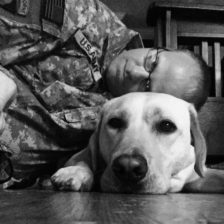Caregiving can be hard. For some, it is a 24/7, 365 job. A duty. Being a caregiver may feel like one is “on call” to be there for their loved one or a family friend. For some, caregiving is special, a calling, if you will.
Caregivers may care for their Veteran, a loved one with Alzheimer’s, a friend with cancer, an elderly parent, or assist one with daily living. A caregiver might also be an unpaid or paid member of the family or social network. Some may get assistance from various caregiver programs, some may not. You can read our story of applying for the VA Caregiver Program here: https://walkingwithmemphis.com/2018/07/denied/
The role of a caregiver is an important one. A role that some may not understand or even know they have. It took me a while to realize that I would indeed be Sam’s caregiver. While he works, and complete tasks on his own (basically, the VA thinks he can be left at home alone), he still needs assistance. Caregiving duties can range from helping with medications (monitoring health), mental health improvements (we have an app called Calm that helps with mediation, bedtime—stories, music, and mindfulness), diet (we are monitoring Sam’s fatty liver now and working on balancing foods).
For some caregivers, self-care is important. We try to implement self-care in our home. Some of those items might be a hair appointment for myself, getting a manicure, or even taking time to read a book (for fun, a book that is not school or work related). For other caregivers, the environment in which they live and which they are caregiving can make a difference too.
Support may be lacking or communication might be difficult between a Veteran and their caregiver. Caregiving can impact relationships in different ways. The Veteran may feel as if they are protecting their loved ones by not sharing information that may hurt feelings or cause guilt.
Various factors can relate to relationship problems. Stress, including post-traumatic stress, health concerns, depression, anxiety, irritability, insomnia, feeling out of place or disconnected, and difficulty with memory. I would be lying if I wrote that these didn’t cause problems for us from time to time, but they do. Sam may bottle up feelings or want to isolate (most of the time he finds work outside or in the garage, other times he needs a drive or even a nap), we work through these by communicating.
You should get support if you feel misunderstood or isolated from your Veteran. I have had conversations with Sam and have said these very words “please don’t shut me out.” Sam’s fear was judgment, he was worried about what I might say or think if and when he shared about his military experiences.
If you are having difficulty communicating or feeling emotionally distant (sometimes this is called “numbing”), withdrawing to avoid confrontation, you should find support. Even if you just need it as a caregiver, there are groups, people, and resources available.
How do we balance all of this?
Very carefully. This is a busy time of year. I’ve just started another semester of teaching and the kids have started a new school year. Sam is about to begin another semester of graduate school, and his art show will be in September.
Not to mention various school and family events, road trips, and the hustle and bustle of life.
Talk with others, finding your tribe, your people, that can make all the difference. Practicing mindfulness, even if you use an app, essential oils, deep breathing, and meditation, it can help. Making an effort to spend time with people you care about and attempting to relax and have fun. Date nights, even out for ice cream, are big nights in our home.
I love being a caregiver. I love being there for Sam. I know some may not understand my role, and that is okay. If you are a caregiver, I am here for you. I hope you have a support system and I hope you get self-care. <3

